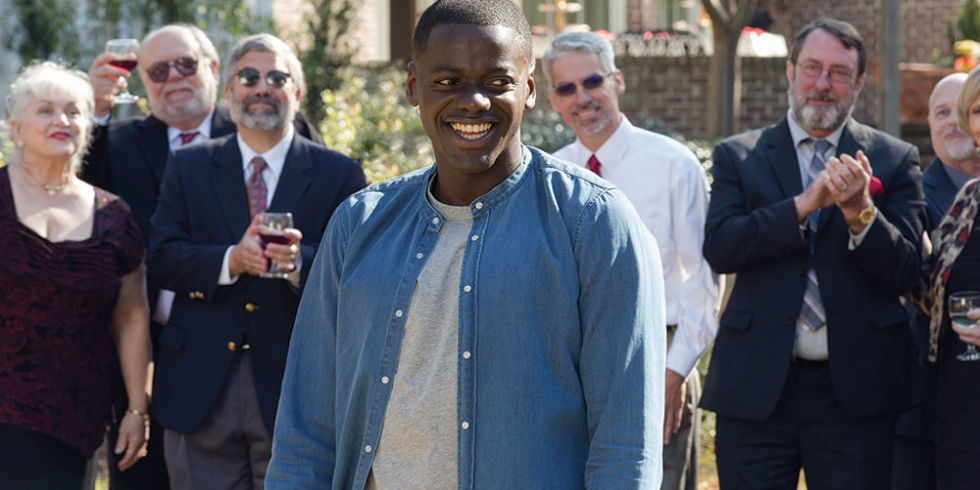Keagan Michael Key and Jordan Peele rose to prominence by
using their comedic platform to discuss issues of race, sociology and identity,
but Peele’s treatment of these topics as the basis of a mostly-serious horror
film has added an urgency and anger that wasn’t always present in their Comedy
Central show. With the election coming fresh off the outrage surrounding the
Black Lives Matter movement and having recently seen many young black men
killed by the authorities, churches burned down and minority voting rights
being compromised, this retrograde of civil rights has had an emotional and
psychological impact on many non-white communities.
“Get Out” takes the basic structure of the 1967 Sidney
Poitier film “Guess Who’s Coming to Dinner” and subverts it with the sci-fi-horror
paranoia of classics such as “Rosemary’s Baby,” “The Stepford Wives” and
“Invasion of the Body Snatchers.”
Daniel Kaluuya plays Chris Washington, the young African
American boyfriend of Rose Armitage, played “Girls” star Allison Williams.
They’ve been dating for five months and Chris has decided travel with his gal to
upstate New York to meet her white, affluent, town-and-country family for the
first time. While nervous about the encounter, everything seems to be
relatively normal. Rose’s neurosurgeon dad (Bradley Whitford) clumsily tries
to code-switch, speaking in what he thinks of as ‘street’ lingo, and is perhaps
too quick to assure Chris that if he could have voted for Obama for a third
term, he would have. And while Rose’s
hypnotherapist mother (Catherine Keener) is a little too insistent on helping
Chris shed his smoking habits with a free session, basically, the two parents
seem warm and accommodating. On the other hand, Rose’s MMA-obsessed brother
(Caleb Landry Jones) displays an intensity that’s a little less predictable.
Things only begin to get especially strange when Chris
approaches the family’s African American hired help, Walter and Georgina (Marcus
Henderson, Betty Gabriel). They’re awake and active at weird hours of the night,
they walk around dazed and unresponsive and they’re hostile or defensive
whenever Chris tries to engage them in conversation. As the story unfolds and plot
points are later revealed, Peele’s script continues to take bigger, wilder
risks and digs deep into the overt social commentary that permeates the film’s
subtext.
It might have been very tempting to portray the devious
whites here as post-colonial, traditional conservatives from the south, but the
movie instead chooses to tap into a much less obvious stereotype;
upper-middle-class, educated neo-liberals. Peele examines the often-parasitic
relationship between the races, and how some classes of whites will co-opt the
struggle of the black experience for their own political or monetary gain,
without ever giving back to the communities they exploit to successfully take
power.
The movie brilliantly and thoroughly eases the audience into
Chris’s perspective so that we are looking at every white character with as
much suspicion as he is. When the privileged guests off the parent’s snooty
garden party ask stupid questions like “what’s the African American experience
been like for you,” even a white audience can feel the sting of condescension
in that moment. Peele’s immersive
subjective direction along with Kaluuya’s nuanced performance helps to sell
what, stripped away from its political context, could come off as fairly goofy
genre material.
“Get Out” is a step further away from the broad sketch
comedy of “Key and Peele,” but it also provides many well-earned laughs of its
own. LilRey Howery is cleverly placed as Chris’s best friend character Rod,
working within the story as the audience’s cipher. Through jokey conversations
with the protagonist, this character points out the inherent pulpiness of the
plot and reminds us that this director understands and has a sense of humor
regarding the horror/thriller traditions he’s working in. Nevertheless, when
the rubber needs to hit the road Peele fully commits to his thought provoking
thesis and allows his racial allegories to approach their brutal conclusions.
Grade: A
Originally Published in the Idaho State Journal/March-2017

No comments:
Post a Comment